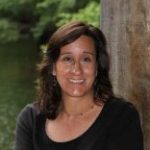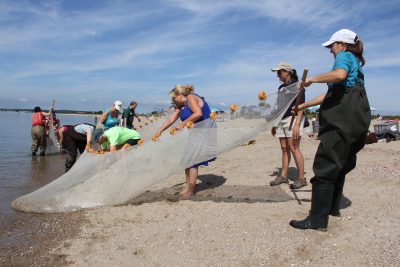 Connecticut Sea Grant Education Coordinator Diana Payne has been promoted to associate professor in residence by the University of Connecticut’s Board of Trustees.
Connecticut Sea Grant Education Coordinator Diana Payne has been promoted to associate professor in residence by the University of Connecticut’s Board of Trustees.
“In the world of ocean literacy, Diana is a recognized leader.” said Nancy Balcom, associate director of Connecticut Sea Grant. “Her promotion underscores the value of her academic contributions to the University and her field.”
Outside of academia, Payne is perhaps best known as creator of the Long Island Sound Mentor Teacher Program and coordinator of the Quahog Bowl, the Connecticut-Rhode Island regional competition of the National Ocean Sciences Bowl. Within the world of marine science education, Payne’s reputation extends nationally and internationally.
“It’s a wonderful recognition of years of effort and collaboration with my colleagues at many levels — local, regional, national, and international.” Payne said. “Partnering with great people at Sea Grant, NOAA, and the National Marine Educators Association has made all of this possible.”
Payne has been with Connecticut Sea Grant for 20 years, beginning as assistant curator of education/marine education specialist at The Maritime Aquarium at Norwalk. After working from the aquarium for three years, the position was moved to new Sea Grant office in the Lowell P. Weicker Jr. Building (formerly the Marine Sciences Building) at the UConn Avery Point campus and Payne was named education coordinator. After obtaining a doctorate in educational psychology from UConn’s Neag School of Education in 2007, Payne added assistant professor in residence to her title, enabling her to submit research proposals as principal investigator. Throughout her career in marine science education, she has distinguished herself among her colleagues statewide, nationally, and internationally with major awards and publications.
In her April 29 letter of congratulations, UConn Vice President for Research, Innovation and Entrepreneurship Radenka Maric described Payne as “a true professional.”
“Diana is a nationally and internationally recognized leader in ocean literacy and coastal and marine education,” said CTSG director Sylvain De Guise. “Not only is she a scholar who writes peer reviewed articles and books/book chapters, but her work is practical and impactful, as it directly helps education professionals and brings benefits to students.”

Payne’s recent accomplishments include the 2018 publication of Exemplary Practices in Marine Science Education, the first international book on marine science education. She co-edited the book with colleagues at the University of Gothenberg in Sweden, Mercy College in Dobbs Ferry, N.Y., and The Marine Biological Association of the United Kingdom. In 2015 she was selected as a Fulbright Scholar and international expert on ocean literacy, working with the Technical University Denmark – National Institute of Water Resources (DTU Aqua). She led a three-part seminar series for graduate students and researchers on translating their research for non-scientific audiences, met with local schools and informal educators, and spoke at international meetings.
She was one of the co-leaders of the recently completed Sea Grant environmental literacy vision document, a National Sea Grant initiative, and currently chairs the National Marine Educators Association’s Ocean Literacy Committee and is a past president of the NMEA. She has also chaired the New England Ocean Science Education Collaborative and the Sea Grant Education Network.
In 2015, she received the Dr. Sigmund Abeles Science Advocate Award from the Connecticut Science Teachers Association and the Connecticut Science Supervisors Association. The award is given to individuals and groups that have shown genuine advocacy for science education in Connecticut. That same year, she received the James Centorino Award from the National Marine Educators Association.
At Connecticut Sea Grant, her duties include directing K-12 formal and informal education programs, organizing and leading professional development for teachers, consulting on curriculum, connecting scientists and educators, and contributing to numerous publications and other resources. She has also participated with scientists on research cruises and helped create opportunities for science teachers to be on board.
She has served on committees that developed the Connecticut Environmental Literacy Plan and that reviewed the Connecticut Science Framework. In addition, Payne has been an evaluator for the National Science Foundation, NOAA, the U.S. Department of Education, and local and regional partners.
In the opening paragraph of article about her experience as a Fulbright Scholar, Payne described how her appreciation for the world ocean motivates her work.
“The ocean. A seemingly vast salty highway covering more than 70 percent of the surface of our planet,” she wrote. “There is only one global ocean. There are numerous ocean basins, but from a water perspective, it’s all connected. That’s how I became interested in making connections with people across the globe, to foster an understanding of the importance of the ocean in our lives, our health, our planet. For everyone on our planet.”